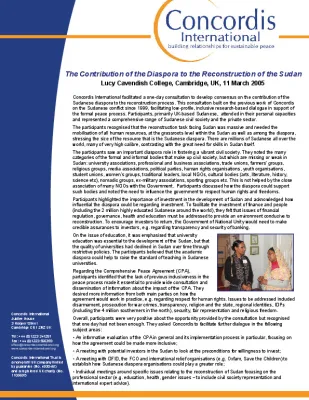Concordis International facilitated a one-day consultation to develop consensus on the contribution of the Sudanese diaspora to the reconstruction process. This consultation built on the previous work of Concordis on the Sudanese conflict since 1999, facilitating low-profile, inclusive research-based dialogue in support of the formal peace process. Participants, primarily UK-based Sudanese, attended in their personal capacities and represented a comprehensive range of Sudanese civil society and the private sector. The participants recognised that the reconstruction task facing Sudan was massive and needed the mobilisation of all human resources, at the grassroots level within the Sudan as well as among the diaspora, stressing the size of the resource that is the Sudanese diaspora. There are millions of Sudanese all over the world, many of very high calibre, contrasting with the great need for skills in Sudan itself. Overall, participants were very positive about the opportunity provided by the consultation but recognised that one day had not been enough. They asked Concordis to facilitate further dialogue in the following subject areas: • An informative evaluation of the CPA in general and its implementation process in particular, focusing on how the agreement could be made more inclusive, • A meeting with potential investors in the Sudan to look at the preconditions for willingness to invest, • A meeting with DFID, the FCO and international relief organisations (e.g. Oxfam, Save the Children) to establish how Sudanese diaspora organisations could play a greater role, • Individual meetings around specific issues relating to the reconstruction of Sudan focusing on the professional sector (e.g. education, health, gender issues – to include civil society representation and international expert advice
Publisher(s)
Publication year
2005
Abstract
ACCESS
File
Document
RS353_.pdf
(333.58 KB)
Access
“Open” means that the resource is available to view, but please check the weblink for restrictions on use. “Restricted” means that the resource is not openly accessible to all, but you can purchase a copy, or your organisation might have an institutional subscription.
